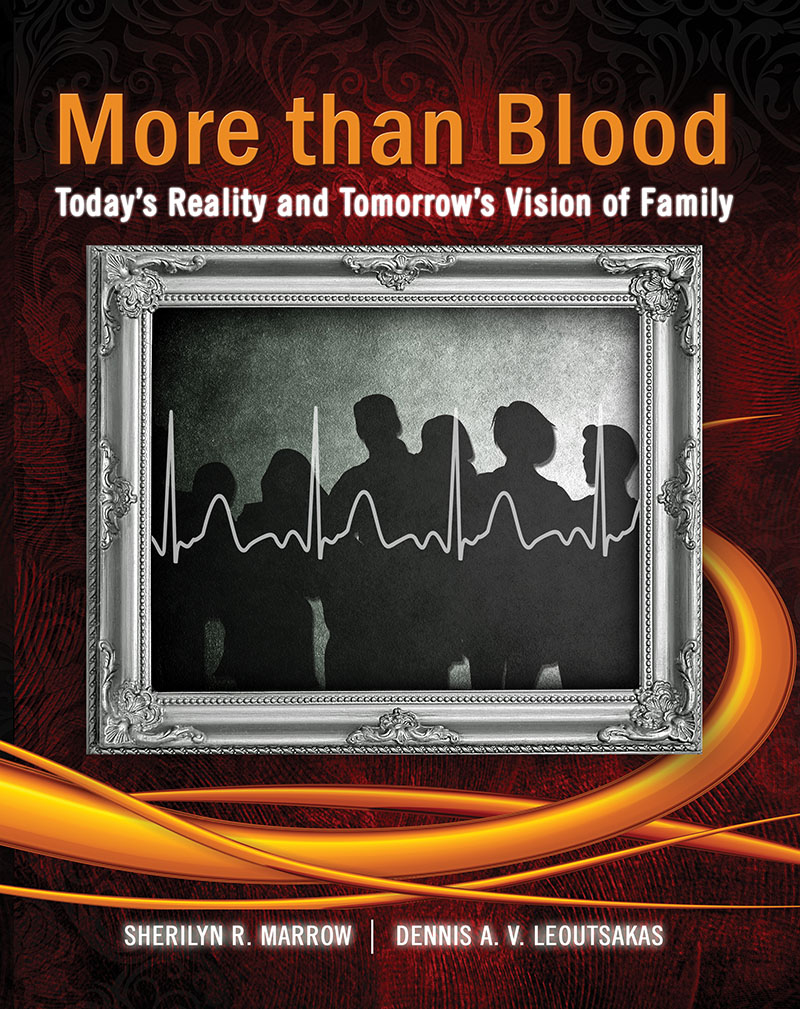More Than Blood: Today's Reality and Tomorrow's Vision of Family
Author(s): Sherilyn Marrow , Dennis Leoutsakas
Edition: 1
Copyright: 2013
Pages: 434
Edition: 1
Copyright: 2013
Pages: 436
Choose Your Format
Family expectations and dynamics are changing and will continue to do so at a rapid pace…
While actual blood relations play an important role in defining family for many, the prevalence of today’s diverse families suggests that families are “more than blood” and have evolved into a new identity—one more broadly defined with evolving norms constantly under revision.
More Than Blood: Today’s Reality and Tomorrow’s Vision of Family is a research-driven, dynamic reader that features current family communication research about interpersonal behaviors and practices of understudied contemporary families.
More Than Blood: Today’s Reality and Tomorrow’s Vision of Family:
- Features fascinating readings that showcase aspects of the “new” or “evotypical” family. These readings will spark provocative discussions, dialogue, debate, and conversation among readers.
- Goes beyond the 1900’s traditional treatment of family research (married two-parent, male-female, 2.2 children) by examining a wide spectrum of family contexts and their surrounding issues.
- Has been crafted by excellent and well-respected authors from numerous fields of study (i.e. communication, family science, psychology, social work, counseling, mental health, law enforcement, and sociology).
- Includes discussion and reflective questions to provoke conversation and highlight the inherent challenges and possibilities experienced by the current everyday family.
Preface
Part 1. The Foundation
Chapter 1 On the Threshold: Evotypical Families Talk Themselves into Being by Kathleen Galvin
Chapter 2 “More Than Blood”: Rethinking Identities, Interactions, and the Future of Contemporary Families by Sherilyn Marrow and Dennis Leoutsakas - Salisbury University
Part 2: Communication Perspectives
Chapter 3 Family Stories: Communicative Values, Interactions, and Burdens by Dennis Leoutsakas - Salisbury University
Chapter 4 The Family That Inks Together Links Together: Tattoos as Family Identifiers by Thomas G. Endres - University of Northern Colorado
Chapter 5 Appreciative Inquiry as a Model for Strengths-Based Decision Making in Couples and Families by Deborah Ballard-Reisch - Wichita State University
Chapter 6 Forgiveness and Reconciliation: Infidelity as a Case Study by Doug Kelley - Arizona State University
Chapter 7 Decision Making in Dual-Career Couples: A Replication and Extension by Lynne M. Webb - University of Arkansas and Douglas C. Pennington - Lynn Haven United Methodist Church, Panama City, Florida
Part 3. Emergence of Evotypical Families
Chapter 8 The Communicative Effort of Negotiating Unmarried Family Life: Friction and Flexibility by Jay Baglia - Kutztown University and Elissa Foster - LeHigh Valley Hospital
Chapter 9 Living with a Ghost: Managing Memory in Postbereaved Families by Christine E. Kiesinger - George Washington University
Chapter 10 State Disciplinary Practices and the Emergence of Coparenting Families by Lynn Comerford - California State University, East Bay
Chapter 11 Single Family: Expanding Our Understanding by Tiffani Baldwin - University of Denver
Chapter 12 Speaking About Coupleness: Relational Roles in the Conversations of Gay and Lesbian Couples by Brian L. Heisterkamp - California State University, San Bernardino
Chapter 13 “Not 16 Any More”: Identification Challenges of Teen Parents by Karen Cirulis - University of Nebraska at Omaha, Omaha Public Schools
Chapter 14 Interracial and Interethnic Families by Francis Wardle - Red Rocks Community College
Chapter 15 (Not) Talking About Race and Difference in Visibly Adoptive Families by Sara Docan-Morgan - University of Wisconsin–La Crosse
Part 4: Family Experiences from a Distance
Chapter 16 On the Evolution of Togetherness and Living with Two Hearts by Vinita Agarwal - Salisbury University and Suchitra Shenoy - De Paul University
Chapter 17 Family Relationships as More Than Blood: Military Families as Dialectics and Discourses by Erin Sahlstein - University of Nevada–Las Vegas and Katheryn Maguire - Cleveland State University
Chapter 18 Ex-Prisoners Are Coming Home: A Reentry Court’s Family Focus by Jeralyn Faris - Purdue University
Chapter 19 Family as an Academic Motivator for African American and Ghanaian Students’ University by Eletra Gilchrist - University of Alabama
Part 5. Families in Grief and Loss
Chapter 20 The Boundary Management and Family Identity Issues in Postbereavement Remarried Families by Carrie West - University of Denver
Chapter 21 The Life of a “Twinkie”: Performing Race as a Korean Adoptee by Gina Bacon -University of Utah
Chapter 22 Obstacle or Opportunity? Toward a Typology of Resilience Rhetoric Following Family Crises by Sherilyn Marrow - University of Northern Colorado, Nancy Karlin -University of Northern Colorado, and Betty Burdoff Brown - University of Northern Colorado
Part 6. Physical and Mental Health Considerations in the Family
Chapter 23 Reframing Addiction by Nicholas Fittante - A.C.T. Family Counseling, Ontario, California
Chapter 24 When Family Blood Kills: Reflections on the Criminal Dangers of Confused Family Allegiances by Brad Goldschmidt - University of Northern Colorado/Greeley, Colorado, Police Department
Chapter 25 Intimacy and Connection: Parents Being Challenged from a Child’s Disability by Stacy L. Carter - Texas Tech University and Narissra Maria Punyanunt-Carter - Texas Tech University
Chapter 26 A “Sounding Board and a Safety Net”: Privacy Boundary Management Between Adolescents with Insulin Dependent Diabetes and Their Parents by Jeanette Valenti - University of Denver
Chapter 27 Defining Caregiving Relationships: Using Intergenerational Ambivalence Theory to Explain Burden Among Racial and Ethnic Groups by Angela C. Henderson - University of Northern Colorado
Chapter 28 Implications of Family Communication on Nutritional Health and Obesity of Children by Wanda Koszewski - University of Nebraska–Lincoln
Part 7. Family Ties and Influences
Chapter 29 The Impact of Communication Technology on the Family by Cheryl Pawlowski - University of Northern Colorado
Chapter 30 The “Plugged-In” Family: The Dialectics of Digital Technology in the Everyday Life of Families by Charles Soukup - University of Northern Colorado
Chapter 31 Pathways to Marital Satisfaction in Interfaith and Interracial Marriages by Patrick C. Hughes - Texas Tech University, John R. Baldwin - Illinois State University, and Bolanle Olaniran - Texas Tech University
Chapter 32 Mother and Daughter-in-Law Relationships: For Better or for Worse? by Paul Yelsma - Western Michigan University
Chapter 33 “I Want to Be a Marcks”: Generativity in Relationships Between Uncles and Nephews by David Weber - University of North Carolina–Wilmington
Chapter 34 Navigating a Mother–Daughter Relationship by K. T. Aldridge - University of Northern Colorado
Chapter 35 Media Depictions of Adoption Narratives by Beth Waggenspack - Virginia Tech University
Chapter 36 From Isolation to Connection: Former Sex Workers Conceptualize Family and Familial Interactions by Jennifer Mayer - University of North Texas and Brian Richardson - University of North Texas
Chapter 37 Mothering at the Boundaries: When Relative Being Is More Important Than Being a Relative by Deborah Eicher-Catt - Pennsylvania State University–York
Epilogue
Sherilyn Marrow (Ph.D., University of Denver) is a family enthusiast specializing in the study of resilience in families and how emotional expressiveness can transform lives. She holds education and communication degrees from the University of Nebraska, and a Ph.D. in human communication and family counseling from the University of Denver. She is a professor at the University of Northern Colorado in the School of Communication, where she has achieved numerous teaching awards, including “Outstanding Woman of the Year.” She is founder/creator of the TalkShareCare Wellness Program—a communication teaching system for both children and adults. The program has outreached to several national and international communities including New Orleans following Hurricane Katrina, and Vina Vieja, Peru following devastating earthquakes. She has been a radio talk show host across Colorado and California, allowing her message on family communication topics to reach larger audiences. Her passions include her family (especially grandsons Luke and James), biking, spirituality, music, creating, and, always, having great conversations with interesting people.
Dennis Leoutsakas (Ph.D., University of South Florida) is an interdisciplinary associate professor at Salisbury University, a state university in the Maryland system of higher education. He was born in New York City and spent his childhood and youth in and around the New York City region. In addition, he has lived in Alaska, Florida, and now Maryland. Prior to becoming a university professor, he was an HIV counselor, a juvenile probation officer, a mental health clinician, and a single foster parent for emotionally struggling youth. His current interest is conducting international narrative research with a focus on the development of adults who were displaced from their birth parents as infants, children, youth, or adolescents.
Family expectations and dynamics are changing and will continue to do so at a rapid pace…
While actual blood relations play an important role in defining family for many, the prevalence of today’s diverse families suggests that families are “more than blood” and have evolved into a new identity—one more broadly defined with evolving norms constantly under revision.
More Than Blood: Today’s Reality and Tomorrow’s Vision of Family is a research-driven, dynamic reader that features current family communication research about interpersonal behaviors and practices of understudied contemporary families.
More Than Blood: Today’s Reality and Tomorrow’s Vision of Family:
- Features fascinating readings that showcase aspects of the “new” or “evotypical” family. These readings will spark provocative discussions, dialogue, debate, and conversation among readers.
- Goes beyond the 1900’s traditional treatment of family research (married two-parent, male-female, 2.2 children) by examining a wide spectrum of family contexts and their surrounding issues.
- Has been crafted by excellent and well-respected authors from numerous fields of study (i.e. communication, family science, psychology, social work, counseling, mental health, law enforcement, and sociology).
- Includes discussion and reflective questions to provoke conversation and highlight the inherent challenges and possibilities experienced by the current everyday family.
Preface
Part 1. The Foundation
Chapter 1 On the Threshold: Evotypical Families Talk Themselves into Being by Kathleen Galvin
Chapter 2 “More Than Blood”: Rethinking Identities, Interactions, and the Future of Contemporary Families by Sherilyn Marrow and Dennis Leoutsakas - Salisbury University
Part 2: Communication Perspectives
Chapter 3 Family Stories: Communicative Values, Interactions, and Burdens by Dennis Leoutsakas - Salisbury University
Chapter 4 The Family That Inks Together Links Together: Tattoos as Family Identifiers by Thomas G. Endres - University of Northern Colorado
Chapter 5 Appreciative Inquiry as a Model for Strengths-Based Decision Making in Couples and Families by Deborah Ballard-Reisch - Wichita State University
Chapter 6 Forgiveness and Reconciliation: Infidelity as a Case Study by Doug Kelley - Arizona State University
Chapter 7 Decision Making in Dual-Career Couples: A Replication and Extension by Lynne M. Webb - University of Arkansas and Douglas C. Pennington - Lynn Haven United Methodist Church, Panama City, Florida
Part 3. Emergence of Evotypical Families
Chapter 8 The Communicative Effort of Negotiating Unmarried Family Life: Friction and Flexibility by Jay Baglia - Kutztown University and Elissa Foster - LeHigh Valley Hospital
Chapter 9 Living with a Ghost: Managing Memory in Postbereaved Families by Christine E. Kiesinger - George Washington University
Chapter 10 State Disciplinary Practices and the Emergence of Coparenting Families by Lynn Comerford - California State University, East Bay
Chapter 11 Single Family: Expanding Our Understanding by Tiffani Baldwin - University of Denver
Chapter 12 Speaking About Coupleness: Relational Roles in the Conversations of Gay and Lesbian Couples by Brian L. Heisterkamp - California State University, San Bernardino
Chapter 13 “Not 16 Any More”: Identification Challenges of Teen Parents by Karen Cirulis - University of Nebraska at Omaha, Omaha Public Schools
Chapter 14 Interracial and Interethnic Families by Francis Wardle - Red Rocks Community College
Chapter 15 (Not) Talking About Race and Difference in Visibly Adoptive Families by Sara Docan-Morgan - University of Wisconsin–La Crosse
Part 4: Family Experiences from a Distance
Chapter 16 On the Evolution of Togetherness and Living with Two Hearts by Vinita Agarwal - Salisbury University and Suchitra Shenoy - De Paul University
Chapter 17 Family Relationships as More Than Blood: Military Families as Dialectics and Discourses by Erin Sahlstein - University of Nevada–Las Vegas and Katheryn Maguire - Cleveland State University
Chapter 18 Ex-Prisoners Are Coming Home: A Reentry Court’s Family Focus by Jeralyn Faris - Purdue University
Chapter 19 Family as an Academic Motivator for African American and Ghanaian Students’ University by Eletra Gilchrist - University of Alabama
Part 5. Families in Grief and Loss
Chapter 20 The Boundary Management and Family Identity Issues in Postbereavement Remarried Families by Carrie West - University of Denver
Chapter 21 The Life of a “Twinkie”: Performing Race as a Korean Adoptee by Gina Bacon -University of Utah
Chapter 22 Obstacle or Opportunity? Toward a Typology of Resilience Rhetoric Following Family Crises by Sherilyn Marrow - University of Northern Colorado, Nancy Karlin -University of Northern Colorado, and Betty Burdoff Brown - University of Northern Colorado
Part 6. Physical and Mental Health Considerations in the Family
Chapter 23 Reframing Addiction by Nicholas Fittante - A.C.T. Family Counseling, Ontario, California
Chapter 24 When Family Blood Kills: Reflections on the Criminal Dangers of Confused Family Allegiances by Brad Goldschmidt - University of Northern Colorado/Greeley, Colorado, Police Department
Chapter 25 Intimacy and Connection: Parents Being Challenged from a Child’s Disability by Stacy L. Carter - Texas Tech University and Narissra Maria Punyanunt-Carter - Texas Tech University
Chapter 26 A “Sounding Board and a Safety Net”: Privacy Boundary Management Between Adolescents with Insulin Dependent Diabetes and Their Parents by Jeanette Valenti - University of Denver
Chapter 27 Defining Caregiving Relationships: Using Intergenerational Ambivalence Theory to Explain Burden Among Racial and Ethnic Groups by Angela C. Henderson - University of Northern Colorado
Chapter 28 Implications of Family Communication on Nutritional Health and Obesity of Children by Wanda Koszewski - University of Nebraska–Lincoln
Part 7. Family Ties and Influences
Chapter 29 The Impact of Communication Technology on the Family by Cheryl Pawlowski - University of Northern Colorado
Chapter 30 The “Plugged-In” Family: The Dialectics of Digital Technology in the Everyday Life of Families by Charles Soukup - University of Northern Colorado
Chapter 31 Pathways to Marital Satisfaction in Interfaith and Interracial Marriages by Patrick C. Hughes - Texas Tech University, John R. Baldwin - Illinois State University, and Bolanle Olaniran - Texas Tech University
Chapter 32 Mother and Daughter-in-Law Relationships: For Better or for Worse? by Paul Yelsma - Western Michigan University
Chapter 33 “I Want to Be a Marcks”: Generativity in Relationships Between Uncles and Nephews by David Weber - University of North Carolina–Wilmington
Chapter 34 Navigating a Mother–Daughter Relationship by K. T. Aldridge - University of Northern Colorado
Chapter 35 Media Depictions of Adoption Narratives by Beth Waggenspack - Virginia Tech University
Chapter 36 From Isolation to Connection: Former Sex Workers Conceptualize Family and Familial Interactions by Jennifer Mayer - University of North Texas and Brian Richardson - University of North Texas
Chapter 37 Mothering at the Boundaries: When Relative Being Is More Important Than Being a Relative by Deborah Eicher-Catt - Pennsylvania State University–York
Epilogue
Sherilyn Marrow (Ph.D., University of Denver) is a family enthusiast specializing in the study of resilience in families and how emotional expressiveness can transform lives. She holds education and communication degrees from the University of Nebraska, and a Ph.D. in human communication and family counseling from the University of Denver. She is a professor at the University of Northern Colorado in the School of Communication, where she has achieved numerous teaching awards, including “Outstanding Woman of the Year.” She is founder/creator of the TalkShareCare Wellness Program—a communication teaching system for both children and adults. The program has outreached to several national and international communities including New Orleans following Hurricane Katrina, and Vina Vieja, Peru following devastating earthquakes. She has been a radio talk show host across Colorado and California, allowing her message on family communication topics to reach larger audiences. Her passions include her family (especially grandsons Luke and James), biking, spirituality, music, creating, and, always, having great conversations with interesting people.
Dennis Leoutsakas (Ph.D., University of South Florida) is an interdisciplinary associate professor at Salisbury University, a state university in the Maryland system of higher education. He was born in New York City and spent his childhood and youth in and around the New York City region. In addition, he has lived in Alaska, Florida, and now Maryland. Prior to becoming a university professor, he was an HIV counselor, a juvenile probation officer, a mental health clinician, and a single foster parent for emotionally struggling youth. His current interest is conducting international narrative research with a focus on the development of adults who were displaced from their birth parents as infants, children, youth, or adolescents.


